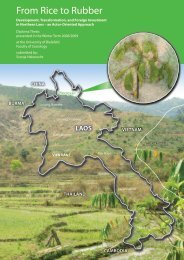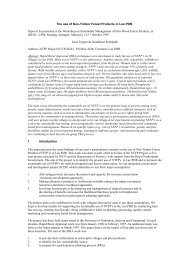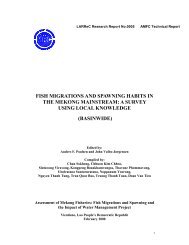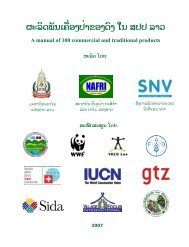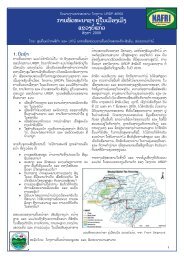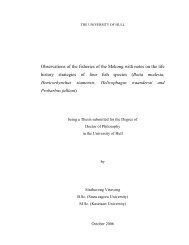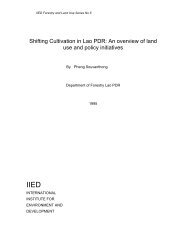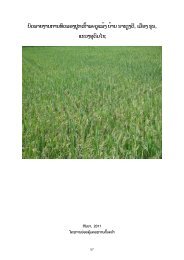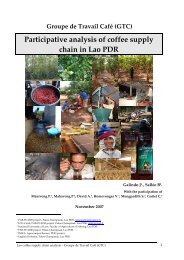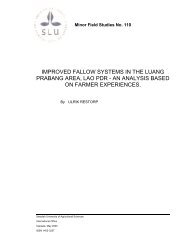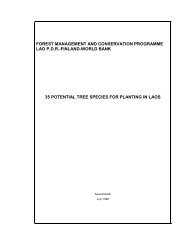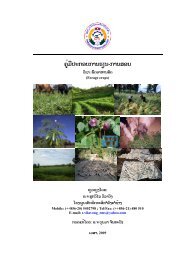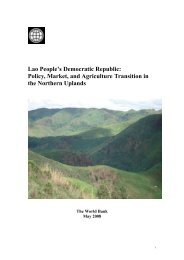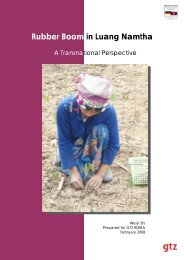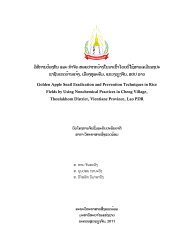Contract Farming in Lao PDR: Cases and Questions - LAD - nafri
Contract Farming in Lao PDR: Cases and Questions - LAD - nafri
Contract Farming in Lao PDR: Cases and Questions - LAD - nafri
Create successful ePaper yourself
Turn your PDF publications into a flip-book with our unique Google optimized e-Paper software.
the surround<strong>in</strong>g Kumban, jammed between hills <strong>and</strong> the river.<br />
Signs of prosperity are fewer. The production group of Nam<br />
Nyon, which traces its roots back to 1997 <strong>and</strong> now covers<br />
395 of 624 families <strong>in</strong> four villages, contracts <strong>in</strong> the dry season<br />
for mangetout; <strong>and</strong> <strong>in</strong> the ra<strong>in</strong>y season for yellow flowers<br />
similar to marigolds, corn, <strong>and</strong> also buys forest produce such<br />
as “mak dao” a k<strong>in</strong>d of small sugar palm, bamboo shoots,<br />
<strong>and</strong> broomgrass.<br />
Cont<strong>in</strong>u<strong>in</strong>g along the river from Nam Nyon, the l<strong>and</strong> leaves<br />
the hills beh<strong>in</strong>d for roll<strong>in</strong>g pla<strong>in</strong>s where st<strong>and</strong>s Si Don Ngeng,<br />
a large, somewhat dusty, village serv<strong>in</strong>g around a dozen<br />
villages <strong>in</strong> the Kumban. There are a few pick-ups <strong>and</strong> tractors<br />
around, some households earn a few extra baht from small<br />
shops. Its prosperity is probably lower than Ban Dan, but<br />
certa<strong>in</strong>ly higher than Nam Nyon. Farmers here grow corn<br />
under contract. The Si Don Ngeng Group was up <strong>and</strong><br />
runn<strong>in</strong>g by 1996. Its 13 staff manage contracts with about<br />
80 families across 12 villages. It is the largest of three groups<br />
<strong>in</strong> the Kumban.<br />
Their prosperity is to some degree determ<strong>in</strong>ed by geography.<br />
Ban Dan <strong>and</strong> Si Don Ngeng both enjoy access to level fields<br />
promis<strong>in</strong>g higher yields than the slopes <strong>and</strong> riverbeds around<br />
Nam Nyon. Their customers <strong>and</strong> markets are mostly found<br />
across the river <strong>in</strong> Thail<strong>and</strong>, not through the mounta<strong>in</strong>s with<br />
the rest of <strong>Lao</strong>s. Evidence of their <strong>in</strong>tegration <strong>in</strong>to the Thai<br />
economy can be seen <strong>in</strong> any wallet or purse <strong>in</strong> which baht fills<br />
the folds <strong>and</strong> kip is small change.<br />
Global connections<br />
Just how far produce from these groups of farmers travels<br />
is hard to say. Doubtless Thai traders are sell<strong>in</strong>g the corn<br />
to Thail<strong>and</strong>’s <strong>in</strong>dustrial food processors, who <strong>in</strong> turn serve<br />
domestic <strong>and</strong> foreign markets. Thail<strong>and</strong>’s agro-<strong>in</strong>dustry<br />
reaches far beyond the Mekong.<br />
“We buy Vietnamese seeds <strong>in</strong> Oudomxay from an agent<br />
for CP Vietnam, which sells different varieties to those from<br />
Thail<strong>and</strong>,” says Somdee Somwongdet, deputy head of the<br />
Ban Dan production group, one of eight groups compet<strong>in</strong>g <strong>in</strong><br />
Ban Dan Kumban.<br />
Thail<strong>and</strong>’s CP (Charoen Phokph<strong>and</strong>) is among the largest<br />
agro-<strong>in</strong>dustry conglomerates <strong>in</strong> Asia.<br />
Members of the production groups <strong>in</strong> Bokeo try to keep<br />
abreast of prices <strong>in</strong> nearby Thai villages. Many have friends or<br />
relatives across the river. In some places they can also listen<br />
to Thai radio, watch Thai television <strong>and</strong> talk on Thai mobile<br />
telephone networks. Such connections also br<strong>in</strong>g new<br />
practices. “Sometimes I go to Thail<strong>and</strong> to see how friends<br />
are do<strong>in</strong>g th<strong>in</strong>gs,” says Simuang Chaloenpon, 64, head of<br />
<strong>Lao</strong> Front for National Construction of Dan T<strong>in</strong> Kumban s<strong>in</strong>ce<br />
2003.<br />
<strong>Contract</strong>? What contract?<br />
<strong>Contract</strong>s themselves are as likely to be by word as on paper.<br />
“I’ve been work<strong>in</strong>g like this for five years based on trust, I<br />
haven’t actually signed a contract,” says Simuang who<br />
decades ago worked his way up the Mekong as a deckh<strong>and</strong><br />
from Vientiane <strong>and</strong> now farms 9 rai (1.44 hectares) of corn<br />
under contract.<br />
Nanuon Siwijai, 45, a farmer who grows corn on 2 rai <strong>in</strong> Si<br />
Don Ngeng signs to acknowledge receiv<strong>in</strong>g seeds, fertilizer<br />
<strong>and</strong> herbicide from the group which he jo<strong>in</strong>ed five years ago.<br />
But he does not <strong>in</strong>terpret that as a formal contract. “I do not<br />
sign a contract, I only make an agreement with the group.”<br />
Familiarity is one reason why some groups feel there is no<br />
need for paper contracts with farmers. “At the very beg<strong>in</strong>n<strong>in</strong>g<br />
we signed contracts with the Thai traders, then with farmers.<br />
Recently we don’t sign contracts with the farmers because<br />
we all know each other <strong>and</strong> how the system works,” says<br />
Myseng Tammawong, 48, a party member who was formerly<br />
the village head <strong>and</strong> is now <strong>in</strong> charge of the f<strong>in</strong>ances of the Si<br />
Don Ngeng production group.<br />
In Nam Nyon the village head doubles as the head of each<br />
village production sub-group guarantee<strong>in</strong>g the farmer will pay<br />
back the cost of seeds <strong>and</strong> fertilizer <strong>and</strong> only sell the crop to<br />
the group.<br />
Whether the group feels a contract is necessary depends<br />
<strong>in</strong> part on the farmer’s reputation, his experience, <strong>and</strong> his<br />
relationships. Simuang, a respected elder, is not required to<br />
sign a contract, unlike others <strong>in</strong> the Kumban.<br />
“At first the group only had a gentleman’s agreement with<br />
farmers. But it was not clear, sometimes the farmers sold to<br />
the market. We discussed this with<strong>in</strong> the group conclud<strong>in</strong>g<br />
we should make contracts with the farmers,” says Somdee,<br />
the Ban Dan production group’s deputy head.<br />
Whatever form the contract takes the obligations are similar.<br />
A group will advance <strong>in</strong>puts like seeds to farmers <strong>in</strong> return for<br />
the right to buy the harvest at an agreed price, which is often<br />
tied to the prevail<strong>in</strong>g market price.<br />
25



